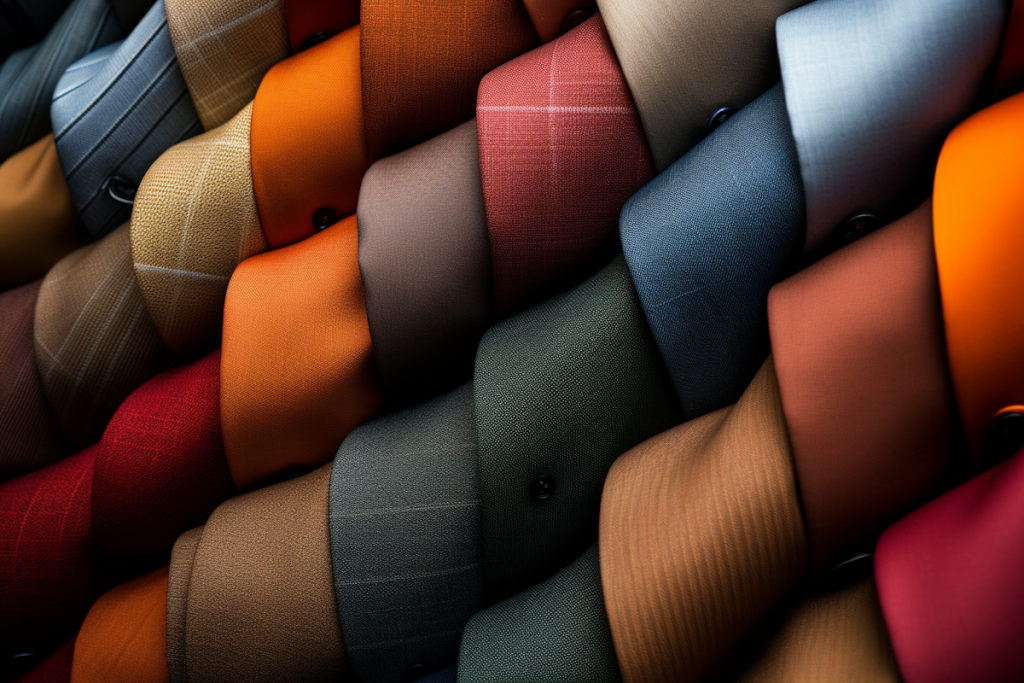Suit fabric makes the suit both literally and figuratively. But what are suits made of?
Men’s suits are primarily made of wool, but they can also be crafted from cotton, linen, silk, polyester, or blends of these materials. The choice of fabric affects the suit’s texture, weight, and durability.
Of course, these aren’t the only materials you might find in a suit. In this post, I’ll give you an overview (in alphabetical order) of the different types of suit materials you may find while searching for your ideal suit. Go through each section to get a quick rundown of the advantages and disadvantages of each suit fabric.

Cashmere Suits
Cashmere suits are the epitome of luxury when it comes to menswear. This soft and luxurious fabric is derived from the undercoat of the cashmere goat. Known for its unmatched softness, lightweight warmth, and plush feel, cashmere is a sought-after material for high-end suits. Its natural insulating properties make it perfect for colder seasons, while its breathable nature keeps wearers comfortable in milder climates.
However, there’s a trade-off for all that luxury. Cashmere suits are delicate, requiring careful maintenance to preserve their pristine appearance. Regular dry cleaning, gentle storage, and avoiding over-wearing can help prolong the life of these suits. They’re also more susceptible to wear and tear compared to more durable materials like wool.

Despite these challenges, many choose cashmere for the sheer opulence it offers. It drapes elegantly, offering a flattering silhouette that’s difficult to achieve with other fabrics. This makes cashmere suits a favorite for special occasions or when one wants to make a lasting impression.
Though investing in a cashmere suit might not be for everyone due to its higher price point and maintenance needs, for those who value unparalleled comfort and luxury, it’s a worthy wardrobe addition.
| Feature | Details |
|---|---|
| Origin | Derived from the undercoat of the cashmere goat. |
| Qualities | Soft, lightweight, insulating, and breathable. |
| Maintenance | Requires careful handling, regular dry cleaning. |
| Best For | Special occasions and cooler seasons. |
The Pros and Cons of Cashmere Suits
Cashmere suits, while luxurious and elegant, come with their own set of advantages and disadvantages.
Pros of Cashmere Suits:
- Luxurious Feel: Cashmere is renowned for its unmatched softness and plush texture, making it comfortable against the skin.
- Lightweight Warmth: The fabric provides excellent insulation, keeping the wearer warm without the heaviness associated with other fabrics.
- Breathability: Cashmere is naturally breathable, ensuring comfort even when worn for extended periods.
- Elegant Drape: The fabric drapes gracefully, offering a refined and flattering silhouette that enhances the overall look of the suit.
- Status Symbol: Given its high price point and luxurious feel, wearing cashmere is often seen as a sign of affluence and good taste.
Cons of Cashmere Suits:
- Delicacy: Cashmere is more delicate than many other suit fabrics, making it more susceptible to wear, pilling, and damage.
- Maintenance Needs: The suits require careful handling and regular dry cleaning to maintain their appearance and longevity.
- Cost: Cashmere is one of the most expensive fabrics due to its rarity and the labor-intensive process of harvesting and refining it. This translates to higher prices for cashmere suits.
- Durability: Compared to wool or synthetic suits, cashmere may not last as long, especially if worn frequently.
- Seasonal Limitations: While great for colder seasons, cashmere might be too warm for hot summer days, limiting its year-round appeal.
Weighing these pros and cons can help individuals decide if a cashmere suit is the right investment for their wardrobe and lifestyle.
Cotton Suits
Cotton suits are the go-to for those seeking a blend of casual and formal. Made from the fluffy fibers of the cotton plant, these suits strike a balance between comfort and style. They’re versatile, being light enough for summer and comfortably warm for cooler spring and fall days. Cotton’s breathable nature means you’re less likely to break into a sweat, making it an excellent choice for outdoor events or warmer climates.
One of the biggest advantages of cotton suits is their ease of maintenance. They can be machine-washed, unlike many other suit fabrics. However, they can wrinkle easily, so a good iron or steamer is essential to keep them looking sharp. Cotton suits also offer a more relaxed look, which can be both a pro and a con depending on the occasion.

When shopping, you’ll find cotton suits in a range of styles and colors. From the classic khaki suit for a summer wedding to darker hues for business events, there’s something for every taste. And since cotton is a natural fiber, it’s a sustainable and eco-friendly choice for the environmentally conscious gentleman.
While cotton might not have the sheer luxury of cashmere or the crisp formality of wool, its versatility, comfort, and ease of care make it a popular choice for many. It’s the ideal suit for someone who values a blend of practicality and style.
| Feature | Details |
|---|---|
| Origin | Derived from the fluffy fibers of the cotton plant. |
| Qualities | Breathable, lightweight, and versatile. |
| Maintenance | Machine-washable but prone to wrinkles. |
| Best For | Summer events, casual business meetings, everyday wear. |
The Pros and Cons of Cotton Suits
Cotton suits offer several advantages but also come with certain drawbacks. Here’s a rundown:
Pros of Cotton Suits:
- Breathability: Cotton is a naturally breathable fabric, making it comfortable to wear, especially in warmer climates.
- Versatility: Suitable for both casual and semi-formal settings, cotton suits can be dressed up or down with ease.
- Ease of Maintenance: Most cotton suits can be machine-washed, unlike many other types of suits which require dry cleaning.
- Comfort: Cotton’s natural softness offers a comfortable fit, making it great for extended wear.
- Eco-Friendly: As a natural fiber, cotton is biodegradable and environmentally friendly, especially when sourced from organic farms.
Cons of Cotton Suits:
- Wrinkling: Cotton suits are prone to wrinkles and creases, which can make them appear less neat compared to fabrics like wool.
- Durability: While cotton is reasonably durable, it might not hold up as well as some other fabrics over time, especially with frequent washing.
- Formality: Cotton has a more casual appearance, making it potentially less suitable for very formal events or business settings.
- Absorption: Cotton absorbs moisture, which can lead to the suit feeling damp if one sweats excessively.
- Lack of Sheen: Unlike some other fabrics, cotton lacks a natural sheen, which can make it appear less luxurious.
Weighing these pros and cons can help individuals decide if a cotton suit is the right fit for their needs and occasions.
Flannel Suits
Flannel suits are the embodiment of classic winter fashion. Once the preferred attire of English gentlemen, these suits are made from a softly woven woolen fabric that has a slightly fuzzy finish. This fuzziness, or “nap,” gives flannel its iconic warm and cozy feel, making it a top choice for cooler climates.
However, flannel isn’t just about warmth; it’s about making a style statement. These suits exude a vintage charm and sophistication, perfect for those looking to stand out during the colder months. The fabric’s weight and structure ensure a flattering drape, complementing a wide range of body types.

That said, flannel suits do come with a caveat. Their thickness means they aren’t suitable for hot weather, and they can be a tad more challenging to maintain than their lighter counterparts. Storing them properly during off-seasons is crucial to prevent moths and maintain the fabric’s integrity.
In a nutshell, if you’re on the hunt for a suit that merges style, tradition, and winter comfort, flannel is your go-to. It’s a sartorial statement that resonates with both vintage aficionados and modern style-seekers.
| Feature | Details |
|---|---|
| Origin | Woven woolen fabric with a napped surface. |
| Qualities | Warm, fuzzy finish, heavyweight, and structured. |
| Maintenance | Requires careful storage; prone to moth damage. |
| Best For | Cooler climates, winter months, and vintage style. |
Pros and Cons of Flannel Suits
Flannel suits, with their distinct charm and coziness, have both admirers and critics. Let’s weigh the pros and cons:
Pros of Flannel Suits:
- Warmth: Flannel’s thick weave and napped surface make it an excellent choice for retaining warmth in colder climates.
- Stylish: The fabric exudes a timeless elegance, offering a vintage charm that’s both sophisticated and unique.
- Comfort: The softness of flannel provides a comfortable wearing experience, especially during chilly days.
- Drape: Flannel’s weight and structure ensure it drapes beautifully, complementing various body types.
- Versatility: While primarily associated with suits, flannel can be used for trousers, vests, and jackets, making it versatile for mix-and-match styles.
Cons of Flannel Suits:
- Seasonal: Due to their warmth, flannel suits aren’t suitable for summer or hotter climates, limiting their wear to specific seasons.
- Maintenance: Flannel can be prone to pilling over time and requires careful storage to protect against moths and maintain fabric quality.
- Weight: Being a heavier fabric, flannel might feel bulky to some wearers, especially those used to lighter suit materials.
- Casual Appearance: The fuzzy finish of flannel can give it a slightly more casual look, which might not be suitable for highly formal events.
- Wrinkles: Flannel can be prone to wrinkles, especially if not stored properly, requiring regular pressing to maintain a neat appearance.
Considering these advantages and disadvantages will help individuals decide if a flannel suit is a fitting addition to their wardrobe.
Linen Suits
Linen suits are summer’s best friend in the world of menswear. Made from the fibers of the flax plant, these suits are lightweight and inherently breathable. They’ve been a classic choice for beach weddings, tropical vacations, and any setting where beating the heat is a priority. The natural, textured weave gives linen suits a relaxed vibe that screams summer sophistication.
However, with all its coolness comes the notorious trait of wrinkling. Linen wrinkles easily, and rather than resisting it, many embrace this characteristic as part of its laid-back charm. It’s like the fabric’s way of saying, “Hey, let’s not be too formal here!”

Another perk is linen’s eco-friendliness. As a natural fiber, it’s biodegradable, and producing it has a smaller environmental footprint compared to some synthetic fabrics. So, while you’re looking sharp and staying cool, you’re also making an eco-friendly fashion choice.
In essence, if you’re scouting for a suit that combines breezy comfort with a hint of rugged elegance, linen is the way to go. It’s the perfect ensemble for those sun-drenched events where looking good without sweating buckets is the goal.
| Feature | Details |
|---|---|
| Origin | Made from the fibers of the flax plant. |
| Qualities | Lightweight, breathable, and natural texture. |
| Maintenance | Prone to wrinkles; requires frequent ironing. |
| Best For | Warm climates, summer events, and casual settings. |
Pros and Cons of Linen Suits
Linen suits, popular in warm settings, have a mix of advantages and challenges. Let’s dive into the pros and cons:
Pros of Linen Suits:
- Breathability: Linen is known for its superior breathability, making it a top choice for hot and humid conditions.
- Lightweight: Its light weave ensures comfort even under the scorching sun.
- Eco-friendly: Linen, being a natural fiber, is biodegradable, and its production often has a lower environmental impact than many synthetic fabrics.
- Distinct Look: The unique texture of linen exudes a relaxed elegance, setting it apart from other suit materials.
- Natural Coolness: Linen has natural cooling properties, making it ideal for warm climates.
Cons of Linen Suits:
- Wrinkles Easily: One of the most common criticisms of linen is its tendency to wrinkle quickly, which can make it appear less polished.
- Durability: While reasonably sturdy, linen can wear out if frequently used and washed, especially at the seams and creases.
- Casual Appearance: The relaxed look of linen might not be suitable for highly formal or corporate events.
- Maintenance: To maintain its crisp appearance, linen suits may require regular ironing or steaming.
- Limited Seasonality: Linen is primarily a summer fabric and might not be suitable for colder seasons.
Considering these pros and cons can help individuals gauge if a linen suit aligns with their style preferences and practical needs.
Polyester Suits
Linen suits are summer’s best friend in the world of menswear. Made from the fibers of the flax plant, these suits are lightweight and inherently breathable. They’ve been a classic choice for beach weddings, tropical vacations, and any setting where beating the heat is a priority. The natural, textured weave gives linen suits a relaxed vibe that screams summer sophistication.
However, with all its coolness comes the notorious trait of wrinkling. Linen wrinkles easily, and rather than resisting it, many embrace this characteristic as part of its laid-back charm. It’s like the fabric’s way of saying, “Hey, let’s not be too formal here!”

Another perk is linen’s eco-friendliness. As a natural fiber, it’s biodegradable, and producing it has a smaller environmental footprint compared to some synthetic fabrics. So, while you’re looking sharp and staying cool, you’re also making an eco-friendly fashion choice.
In essence, if you’re scouting for a suit that combines breezy comfort with a hint of rugged elegance, linen is the way to go. It’s the perfect ensemble for those sun-drenched events where looking good without sweating buckets is the goal.
| Feature | Details |
|---|---|
| Origin | Made from the fibers of the flax plant. |
| Qualities | Lightweight, breathable, and natural texture. |
| Maintenance | Prone to wrinkles; requires frequent ironing. |
| Best For | Warm climates, summer events, and casual settings. |
Pros and Cons of Polyester Suits
Polyester suits, while practical in many respects, have a mix of benefits and drawbacks. Here’s a rundown:
Pros of Polyester Suits:
- Wrinkle-Resistant: One of polyester’s prime features is its resistance to wrinkles, ensuring the suit maintains a neat appearance.
- Durability: Polyester fibers are strong, making these suits long-lasting, especially with proper care.
- Affordability: Generally, polyester suits are more budget-friendly compared to those made from natural fabrics like wool or linen.
- Easy Maintenance: Many polyester suits can be machine washed, offering convenience in care.
- Shape Retention: Polyester suits tend to hold their shape well over time, reducing the need for frequent tailoring.
Cons of Polyester Suits:
- Breathability: As a synthetic material, polyester doesn’t breathe as well as natural fabrics, which can make it less comfortable in warm conditions.
- Feel: Polyester lacks the soft, luxurious feel of natural fibers, which can be a downside for those valuing tactile comfort.
- Environmental Concerns: Polyester production involves petroleum, and the fabric is non-biodegradable, raising environmental concerns.
- Static Build-Up: Polyester can sometimes cause static, leading to clinginess and minor electric shocks.
- Less Natural Look: The shine or sheen of some polyester suits might not appeal to those looking for a matte, natural finish.
Considering these pros and cons can help guide individuals in their decision-making process when considering a polyester suit for their wardrobe.
Poplin Suits
Poplin suits are all about that smooth finish and subtle sheen. Originally crafted from silk, poplin has evolved to commonly be made from cotton or a blend of synthetic materials today. This fabric is characterized by its tight, plain weave which lends it a crisp appearance, making it a go-to for those who want a polished look without going too formal.
Poplin’s lightweight nature makes it a popular choice for warmer climates. Imagine attending a summer business lunch or an outdoor event; this suit is your buddy ensuring you’re both comfortable and sharp. Another bonus? Its smooth surface makes it resistant to staining.

However, every coin has its flip side. Poplin can wrinkle more easily compared to some heavier fabrics. And while it’s great for sunny days, it might not provide the warmth you’d need on a chilly evening.
To sum it up, if you’re in the market for a suit that’s lightweight, smooth, and perfect for those sunlit occasions, poplin should be on your radar. It’s the fine balance between casual and dressed up, especially when temperatures rise.
| Feature | Details |
|---|---|
| Origin | Historically from silk, now often cotton or blends. |
| Qualities | Lightweight, smooth finish, and slight sheen. |
| Maintenance | Can wrinkle; may require regular ironing. |
| Best For | Warm climates, semi-formal to casual occasions. |
Pros and Cons of Poplin Suits
Poplin suits, with their distinct lightweight weave, have characteristics that some find appealing, but they’re not without their drawbacks. Let’s break down the pros and cons:
Pros of Poplin Suits:
- Lightweight: Poplin’s tight, plain weave ensures it remains lightweight, ideal for comfort in warmer weather.
- Smooth Appearance: The fabric has a smooth, polished finish, lending a refined look to the wearer.
- Stain Resistance: Due to its smooth surface, poplin tends to resist staining better than some other fabrics.
- Versatility: Suitable for both casual and semi-formal settings, poplin suits can adapt to various occasions.
- Breathability: Its lightness and weave make poplin relatively breathable, adding to its comfort during hot days.
Cons of Poplin Suits:
- Wrinkling: Poplin can be prone to wrinkles, which might require frequent ironing or steaming to maintain a crisp appearance.
- Durability: Being lightweight, poplin suits might not be as durable as those made from heavier materials.
- Limited Insulation: Poplin suits aren’t ideal for colder weather due to their lightweight nature.
- Potential for Sheen: Some poplin suits can have a slight sheen, which may not be preferred by everyone, especially in professional settings.
- Variability in Quality: Depending on the blend (like cotton-poplin vs. synthetic blends), there can be a significant variation in the suit’s feel and longevity.
Considering these advantages and drawbacks can help one decide whether a poplin suit fits their style and practical needs.
Seersucker Suits
Seersucker suits are a southern classic and the embodiment of summertime elegance. Picture it: warm, balmy weather, garden parties, and this lightweight, puckered fabric ensuring you stay dapper and cool. Derived from the Persian words “sheer” and “shakar” (meaning “milk and sugar”), seersucker refers to the fabric’s distinctive alternating smooth and bumpy texture.
What sets seersucker apart is its unique weaving process. By pulling certain warp yarns tight and letting others slacken, it creates that signature crinkled appearance. This not only adds to its charm but ensures the fabric remains mostly lifted off the skin, promoting airflow and minimizing sweat. No wonder it’s a favorite for hot, humid climates!

However, it’s not all garden parties and mint juleps. Seersucker has a distinctively casual vibe, which means it might not be your first choice for a formal business meeting. Still, for those relaxed summer events or when you want to sport a classic American style with a twist, seersucker’s your guy.
In essence, if you’re after a suit that combines lightweight comfort with vintage flair, seersucker should be on your list. It’s more than just a fabric; it’s a statement of leisurely elegance.
| Feature | Details |
|---|---|
| Origin | Derived from Persian words for “milk and sugar.” |
| Qualities | Lightweight, puckered texture, promotes airflow. |
| Maintenance | Generally low maintenance due to its crinkled look. |
| Best For | Warm climates, casual to semi-formal summer events. |
Pros and Cons of Seersucker Suits
Seersucker suits, with their iconic crinkled texture, bring an air of vintage charm to warm-weather fashion. However, like any style choice, they have both advantages and disadvantages. Let’s break down the pros and cons:
Pros of Seersucker Suits:
- Airflow: The puckered texture allows for increased airflow, making seersucker suits remarkably cool and comfortable in hot weather.
- Low Maintenance: The naturally crinkled look means you don’t have to worry about ironing out every wrinkle.
- Lightweight: The fabric is generally lightweight, enhancing its summer-appropriate qualities.
- Distinct Style: Seersucker’s unique texture makes a statement, setting you apart from the crowd.
- Versatility: While they lean towards casual, seersucker suits can be dressed up or down based on the occasion.
Cons of Seersucker Suits:
- Casual Appearance: Its laid-back vibe might not be suitable for formal events or certain business settings.
- Limited Seasonality: Seersucker is primarily a spring and summer fabric, making it less versatile year-round.
- Texture Not for Everyone: The puckered texture, while distinctive, might not align with everyone’s fashion preferences.
- Wear and Tear: The lightweight nature can mean it’s less durable than heavier fabrics if worn frequently.
- Potential Fading: Over time and with frequent washing, seersucker colors might fade, especially with brighter hues.
Considering these pros and cons can guide individuals in determining whether a seersucker suit aligns with their sartorial preferences and the occasions they frequent.
Silk Suits
Silk suits are the epitome of luxury in the world of menswear. When you hear “silk,” think sophistication, shine, and unparalleled softness. Derived from the silkworm’s cocoon, silk has been coveted for millennia, adorning royalty and high society alike.
What’s the magic behind silk’s appeal? Firstly, its natural sheen instantly elevates any outfit, providing a radiance hard to replicate with other materials. Additionally, the fabric feels incredibly smooth against the skin, ensuring you’re not just looking good but feeling fantastic too. Moreover, silk’s natural temperature-regulating properties mean you can stay cool on hot days and relatively warm when it’s cooler.

Yet, all that glitters isn’t gold. Silk requires a bit of pampering. It’s more delicate than many other suit fabrics, so you’d need to be cautious about potential snags or stains. Plus, professional cleaning is often recommended, which could add to maintenance costs. In essence, a silk suit is like that luxury sports car – undeniably attractive but requires a little extra care.
To wrap it up, if you’re after a suit that screams luxury and offers unparalleled comfort, silk is a top contender. Just remember, handle with care!
| Feature | Details |
|---|---|
| Origin | Derived from the silkworm’s cocoon. |
| Qualities | Luxurious sheen, soft feel, temperature-regulating. |
| Maintenance | Delicate; often requires professional cleaning. |
| Best For | Formal events, occasions where luxury is paramount. |
Pros and Cons of Silk Suits
Silk suits, with their luxurious allure, offer numerous advantages, but they come with some caveats. Here’s a balanced take on the pros and cons:
Pros of Silk Suits:
- Luxurious Feel: Silk is incredibly soft to the touch, ensuring the wearer experiences unmatched comfort.
- Elegant Sheen: The natural luster of silk gives suits a sophisticated and polished appearance.
- Temperature Regulation: Silk naturally helps regulate body temperature, making the wearer feel cooler in heat and warmer in cold.
- Lightweight: Silk suits are generally lightweight, making them comfortable to wear.
- Breathability: Silk fibers allow the skin to breathe, further enhancing comfort, especially in warmer settings.
Cons of Silk Suits:
- Delicacy: Silk is more prone to snags, tears, and damage compared to more robust fabrics like wool or cotton.
- Maintenance: Silk suits often require professional cleaning and are more susceptible to water spots or stains.
- Cost: Given its luxurious nature, silk often commands a higher price point.
- Wrinkling: Silk can wrinkle easily, which means frequent steaming or careful storage may be necessary.
- Moisture Sensitivity: Prolonged exposure to sweat or moisture can weaken silk fibers or cause discoloration.
When weighing the decision to invest in a silk suit, it’s essential to consider both its undeniable luxury and the care it demands. With mindful maintenance, a silk suit can be a statement piece in any wardrobe.
Tweed Suits
Ah, tweed suits! Think countryside elegance, British nobility on their weekend getaways, or even professors deep in thought in their cozy studies. Tweed, originating from Scotland, is a rough, woolen fabric known for its unique textured patterns and warmth. The patterns often involve herringbone, checks, or plain twills.
What makes tweed stand out is its durability combined with style. It’s designed to withstand the unpredictable British weather, making it both water-resistant and insulating. That’s why it’s a favorite for outdoor activities, from hunting to casual walks in the brisk air. Plus, it’s versatile in style, suitable for both semi-formal occasions and everyday wear.

However, while tweed is a timeless classic, it might feel a tad heavy or warm for those sweltering summer days. It’s more attuned to the chilly winds of autumn and the crispness of winter. Also, its distinctive style can be a bit bold for some, making it less universal compared to, say, a simple navy wool suit.
In a nutshell, a tweed suit is your rugged companion for cooler climes, oozing with vintage charm and practicality. If you want to channel that classic British elegance, tweed’s the word!
| Feature | Details |
|---|---|
| Origin | Scotland. |
| Qualities | Rough texture, warm, durable, often patterned. |
| Maintenance | Generally low maintenance; can be brushed clean. |
| Best For | Cooler climates, semi-formal to casual settings. |
Pros and Cons of Tweed Suits
Tweed suits, with their unmistakable texture and patterns, bring forth both a sense of tradition and rugged sophistication. However, as with all fabrics, tweed comes with its set of advantages and potential drawbacks. Let’s dive into them:
Pros of Tweed Suits:
- Warmth: Tweed is a heavyweight fabric that provides excellent insulation, making it ideal for cooler climates or seasons.
- Durability: Crafted to endure the unpredictable British outdoors, tweed suits are made to last.
- Water-Resistant: The tight weave and natural oils in the wool give tweed a degree of water resistance.
- Distinctive Style: The unique patterns and textures of tweed are instantly recognizable and can make quite a style statement.
- Versatility: Tweed can transition seamlessly from casual wear to semi-formal settings.
Cons of Tweed Suits:
- Heaviness: Tweed’s weight might not be comfortable for everyone, especially in warmer climates or seasons.
- Less Breathable: Due to its density and warmth, tweed might feel too stifling on hot days.
- Bold Patterns: While many love tweed’s patterns, they can be a bit too distinctive for those who prefer subtler fabrics.
- Potential for Itchiness: Some people find the coarse texture of certain tweeds a tad itchy against the skin.
- Bulkiness: Tweed suits can add a bit of bulk, potentially affecting the silhouette.
Tweed suits remain a beloved choice for those who appreciate their blend of style, tradition, and durability. While they might not be everyone’s cup of tea, there’s no denying their lasting impact on the world of fashion.
Wool Suits
Wool suits are the quintessential choice for many when it comes to formal wear. If suits were a royal family, wool would undoubtedly wear the crown. Originating from the fleece of sheep, wool has been the go-to material for suiting for centuries, thanks to its adaptability and sheer elegance.
What sets wool apart is its marvelous adaptability. It insulates marvelously in the winter while also boasting breathability for the warmer months. This makes wool suits an excellent all-year-round option. Additionally, wool naturally drapes well, providing that sleek silhouette that’s the hallmark of a well-fitted suit. And for those who appreciate variety, wool offers a range of weights and textures, from lightweight tropical wools to heavier flannels.

However, as majestic as wool is, it’s not invincible. Direct and prolonged exposure to sunlight can weaken its fibers, and without proper care, it can lose its shape or even get moth-eaten. Yet, with some TLC, a wool suit can remain a timeless piece in any wardrobe.
In essence, for those seeking a versatile, elegant, and evergreen suit, wool often tops the list. It’s the classic black dress of men’s fashion – always relevant and undeniably stylish.
| Feature | Details |
|---|---|
| Origin | Fleece of sheep. |
| Qualities | Adaptable, insulating, breathable, drapes well. |
| Maintenance | Requires care; avoid prolonged sun, store correctly. |
| Best For | All-year-round wear; versatile occasions. |
The Different Wool Spins
When discussing wool, particularly in the context of suiting, you might come across terms like “Super 120s” or “Super 200s”. These refer to the fineness of the wool fibers and are a way to gauge the quality, feel, and sometimes, the price of the fabric.
- The ‘Super’ System: This numbering system is essentially a measure of the wool fiber’s diameter in microns. A higher “Super” number indicates finer, thinner fibers. For example, Super 120s wool fibers would be thicker than those of Super 200s.
- Super 120s: This is a mid-range fineness, offering a good balance between durability and luxury. It feels soft to the touch and is suitable for regular wear. It’s a popular choice for business suits that are worn often but still need to maintain a touch of luxury.
- Super 200s: On the luxury end of the spectrum, Super 200s wool is extremely fine, making it feel very soft and silky. However, this fineness can also mean that it’s less durable and more prone to wear and tear than lower Super numbered fabrics. Suits made from this fabric are often reserved for special occasions and might carry a premium price tag.
- Durability vs. Luxury: Generally, as the Super number increases, so does the fabric’s softness, sheen, and price. However, its durability might decrease. So, while Super 150s or Super 200s might feel incredibly luxurious, they might not be the best choice for a suit you intend to wear very frequently.
In summary, the Super system helps you determine the fineness of wool suits. While higher Super numbers denote luxury, it’s essential to factor in how and where you’ll wear the suit to ensure it meets your needs in terms of durability and function.
Pros and Cons of Wool Suits
Wool suits are a staple in many wardrobes due to their versatility and timeless appeal. But, like any material, they come with their distinct advantages and potential downsides. Let’s weigh the pros and cons:
Pros of Wool Suits:
- Versatility: Wool suits are suitable for both hot and cold climates. The fabric insulates well in the cold and breathes in the heat.
- Drape: Wool naturally drapes beautifully, ensuring a sleek and flattering silhouette when tailored well.
- Durability: With proper care, wool suits can last for years without showing significant signs of wear.
- Resilience: Wool fibers are naturally elastic, which means they resist wrinkles and retain their shape over time.
- Variety: Wool comes in various weights, weaves, and finishes, allowing for a diverse range of styles and textures.
Cons of Wool Suits:
- Maintenance: Wool suits require careful cleaning and storage. They’re often dry-clean only and can be susceptible to moths.
- Price: High-quality wool, especially finer grades like Super 150s or Super 200s, can be more expensive.
- Sensitivity to Sunlight: Prolonged exposure to direct sunlight can weaken wool fibers over time.
- Weight: While there are lightweight wool options, some woolen suits might feel heavy, especially in hotter temperatures.
- Potential Allergies: Some people might find certain wool fabrics itchy or irritating, especially if they have sensitive skin or wool allergies.
While wool suits boast many advantages that make them a favorite choice for many, it’s essential to consider your specific needs, budget, and preferences when deciding if a wool suit is right for you.
Blended Suit Fabrics
Suit blends combine the strengths of different fibers to offer unique properties and textures, while often addressing some of the individual fabrics’ limitations. This fusion can lead to enhanced durability, improved drape, and even a more attractive price point.
A popular blend you might come across is wool-silk, which takes the warmth and drape of wool and marries it with the sheen and luxury of silk. This results in a suit that’s soft, shiny, and perfect for occasions when you want to make an impression. Another common blend is wool-polyester. Here, wool provides a natural look and feel, while polyester adds durability and wrinkle resistance. Additionally, polyester can make the suit more affordable, as it’s generally less expensive than natural fibers.

However, not all blends are created equal. It’s essential to check the percentage of each material in the blend to ensure you’re getting the desired qualities. For instance, a suit with a higher percentage of polyester might lack the breathability of a predominantly wool suit. Ultimately, suit blends aim to give wearers the best of both worlds. Still, it’s always a good idea to feel the fabric and consider the blend ratio before making a purchase.
Here’s a quick glance at the world of suit blends:
| Blend | Benefits | Potential Downsides |
|---|---|---|
| Wool-Silk | Softness, sheen, lightweight, good drape. | Can be pricey, may need special care. |
| Wool-Polyester | Durability, wrinkle resistance, affordability. | Can be less breathable. |
| Wool-Linen | Breathability, unique texture, good for summer. | May wrinkle more easily. |
| Wool-Cashmere | Added softness, luxurious feel, warmth. | Higher cost, might be less durable. |
Remember, the goal of blends is to optimize comfort, durability, appearance, and cost. Always consider the occasion and your personal preferences when choosing the right blend.
Final Thoughts on Suit Materials
Remember, there’s no one-size-fits-all when it comes to suit materials. While wool stands out as a versatile choice, each fabric shines best in specific settings and situations. Consequently, the ideal suit material might shift based on the occasion and the environment.
A golden rule? Opt for a suit fabric that feels good against your skin and aligns with your budget. Personally, I believe you can’t go wrong with a wool suit or a wool blend. In fact, a wardrobe filled with wool suits could have you stylishly covered for a lifetime.
